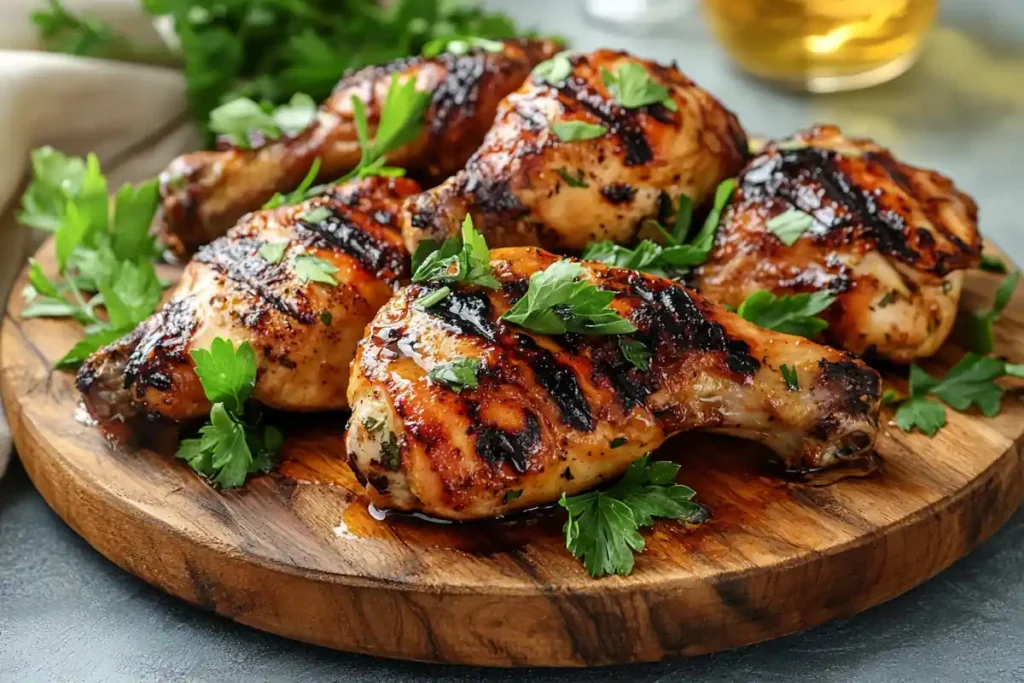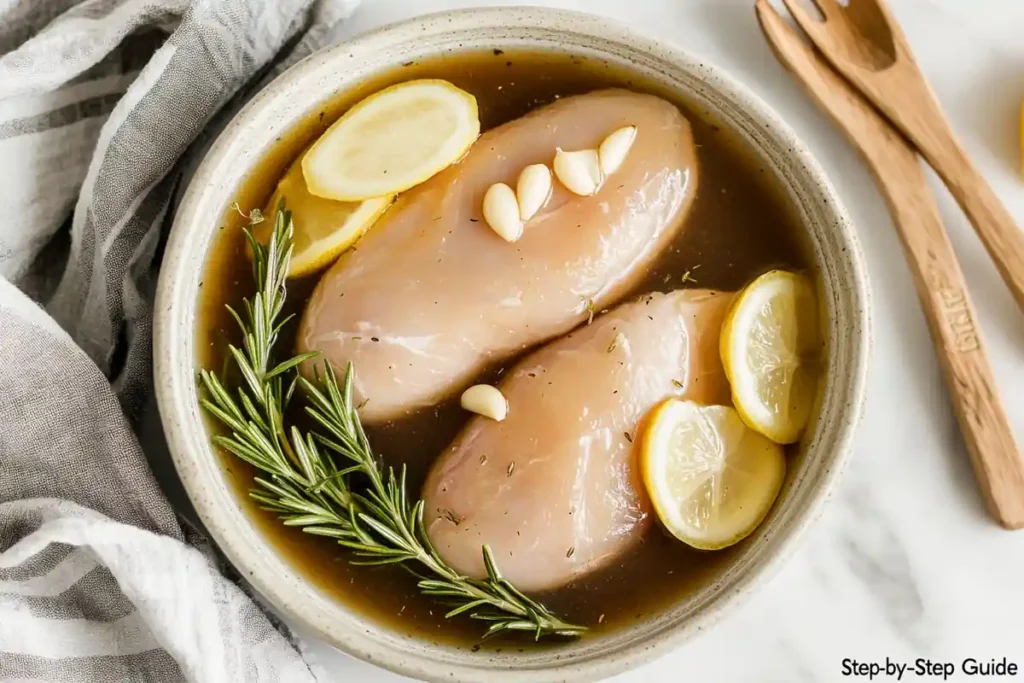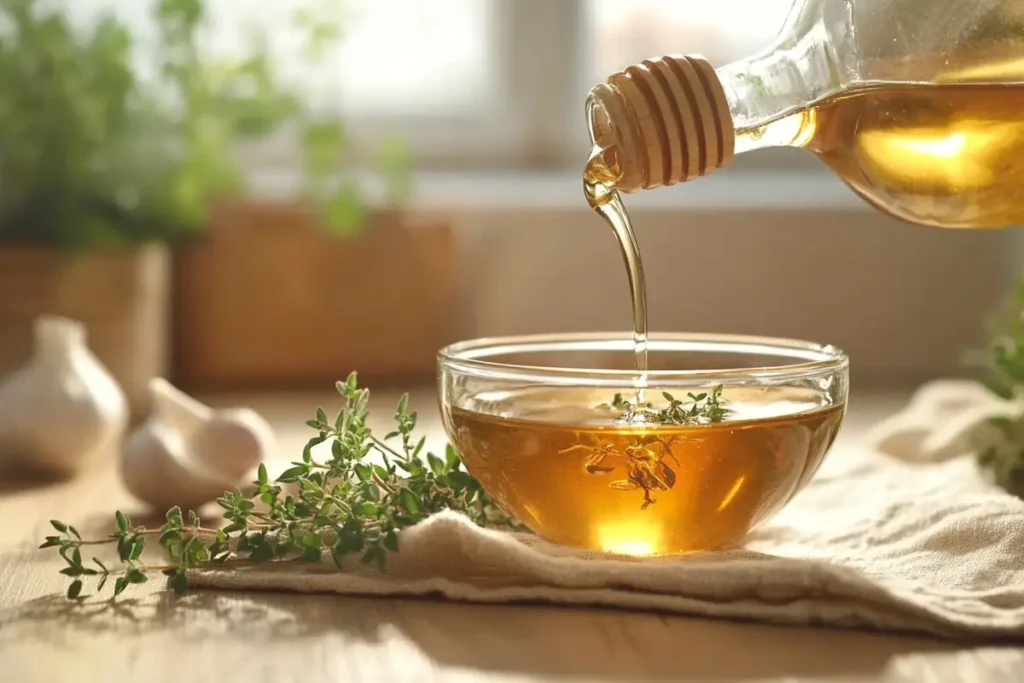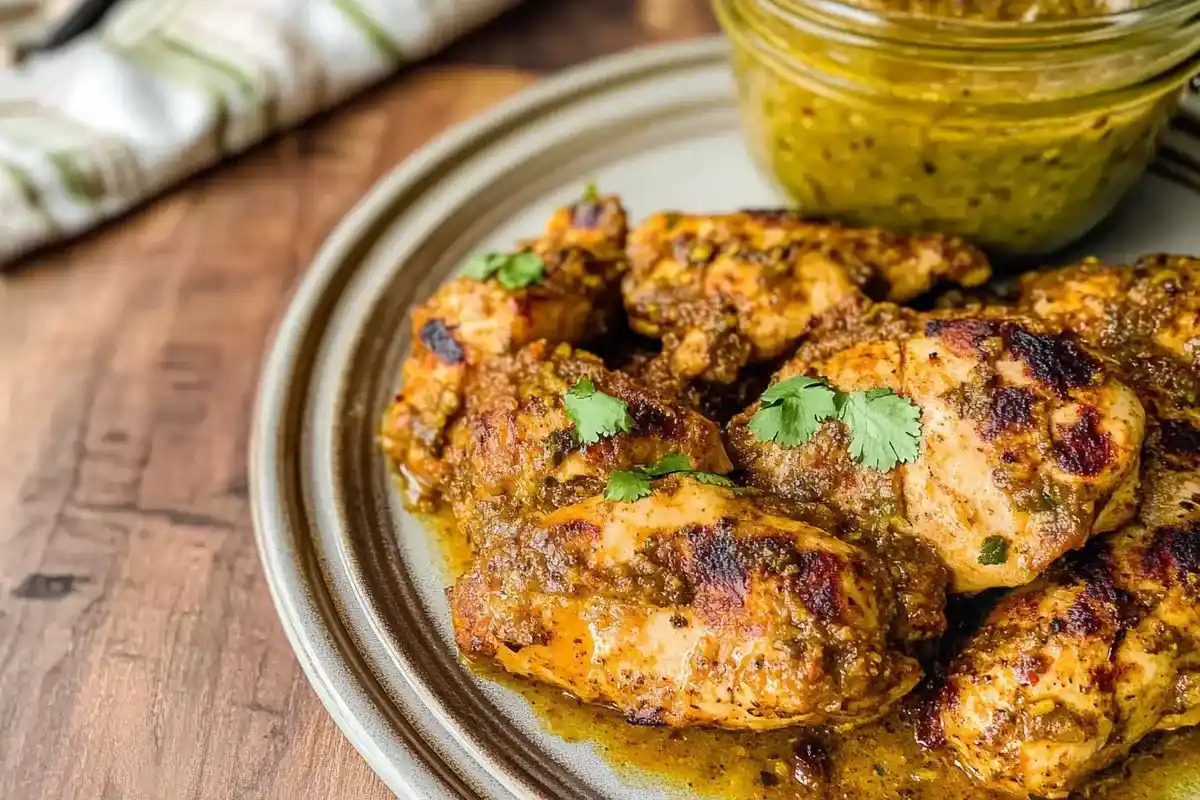introduction
What does vinegar marinade do to chicken? It’s a question many cooking enthusiasts and home chefs ask when seeking the secret to tender, flavorful meat. Vinegar isn’t just a tangy addition—it’s a powerful ingredient that breaks down tough fibers, enhances flavor, and improves the overall texture of chicken. In this guide, we’ll explore the science behind vinegar marinades, how they work, and why they’re a game-changer in the kitchen. Plus, you’ll get expert tips and easy recipes to create the perfect marinade every time. Let’s dive in!
Introduction to Vinegar Marinating
Marinating chicken isn’t just about soaking meat in a flavorful liquid—it’s a culinary technique that unlocks taste and texture like no other. Vinegar plays a starring role in this process, offering a balance of acidity that works wonders on poultry.
What Is Marinating?
Marinating is the process of soaking food in a seasoned liquid before cooking. This step infuses flavors into the meat while also altering its structure. For chicken, marinades can make a noticeable difference, turning an ordinary meal into a succulent, flavor-packed dish.
How Does Vinegar Fit Into Marinades?
Vinegar, as an acidic ingredient, is a game-changer in marinades. It works to break down proteins in chicken, allowing flavors to penetrate deeper into the meat. Beyond just taste, vinegar can also improve the texture, making the chicken tender and juicy. Whether it’s apple cider vinegar or white vinegar, the acidity adds a unique depth of flavor.
Importance of Acidic Ingredients in Cooking
Acids like vinegar, lemon juice, or yogurt are key to successful marinades. They create the perfect environment for softening meat fibers while balancing the richness of other ingredients like oils and spices. Without an acidic component, marinades may fall flat in both flavor and effect.
By understanding these basics, you’re already on the path to cooking better chicken. Stay tuned for more in-depth insights as we unravel the mysteries of vinegar marinades!
The Role of Vinegar in Chicken Marinades

Understanding what vinegar marinade does to chicken is key to mastering its use in the kitchen. Vinegar serves as more than just a tangy flavor booster—it’s a powerful agent that transforms chicken into a tender, flavorful dish.
Tenderizing Chicken: How It Works
Vinegar works as a tenderizer by breaking down the proteins in chicken. The acidic nature of vinegar helps unravel the structure of proteins, making the chicken softer and easier to chew. This effect is particularly useful for tougher cuts of meat or when preparing grilled chicken that needs to stay moist under high heat.
- The acid in vinegar reacts with muscle fibers, helping to soften their texture.
- Overdoing it, however, can cause the chicken to become mushy. A proper balance is essential.
Flavor Enhancement: A Balance of Acid and Spices
One of the standout qualities of vinegar marinades is their ability to enhance flavors. By combining vinegar with herbs, spices, and oils, you can create a marinade that infuses chicken with depth and complexity.
- Vinegar’s tanginess complements a wide range of flavors, from sweet to spicy.
- Popular combinations include apple cider vinegar with honey or balsamic vinegar with garlic and rosemary.
The Science of pH and Protein Breakdown
The magic of vinegar lies in its pH. Lowering the pH of the chicken’s surface allows other marinade ingredients to penetrate more effectively. This creates a uniform flavor throughout the meat.
To learn more about the science of marinades and tips for balancing flavors, check out How Long Should Chicken Stay in a Marinade?.Types of Vinegar Used in Chicken Marinades
Choosing the right vinegar for your marinade can therefore take your chicken dishes to the next level. Different types of vinegar bring unique flavors and properties to the table, making it essential to select the one that suits your dish best.
White Vinegar: The Most Common Choice
White vinegar is a kitchen staple and a classic choice for marinades. In addition, its strong acidity makes it ideal for tenderizing chicken quickly. Pair it with bold spices like paprika or chili for a sharp, vibrant flavor that stands out.
Apple Cider Vinegar: Sweetness Meets Acidity
Apple cider vinegar is loved for its subtle sweetness and fruity undertones. It works wonderfully in marinades meant for grilled or roasted chicken, thus adding complexity without overpowering the dish.
- In addition, it is best paired with honey, Dijon mustard, or thyme for a balanced profile.
- This vinegar is excellent for slow-cooking recipes or smoky BBQ chicken.
Balsamic Vinegar: Adding a Touch of Sophistication
Known for its sweet and tangy flavor, balsamic vinegar is a favorite for gourmet marinades. On the other hand, it pairs beautifully with garlic, rosemary, and olive oil for an elegant finish.
- It is ideal for baked or roasted chicken recipes.
- In addition, it adds a caramelized glaze when cooked, enhancing both taste and appearance.
Rice Vinegar and Wine Vinegar: Regional Twists
Rice vinegar is a staple in Asian-inspired dishes. Moreover, its mild acidity complements soy sauce, ginger, and sesame oil in stir-fries or grilled chicken skewers. On the other hand, wine vinegar, both red and white, introduces a more refined flavor, perfect for Mediterranean recipes.
For more inspiration, explore the Mexican Chicken Marinade Guide for unique flavor profiles.
Step-by-Step Guide to Marinating Chicken with Vinegar

If you’ve ever wondered what does vinegar marinade do to chicken, you’re about to find out how to harness its full potential. By following this step-by-step guide, you can ensure your chicken is flavorful, tender, and perfectly marinated every time.
Preparation: Choosing the Right Chicken Cuts
Start by selecting the right cut of chicken for your recipe. Whether it’s thighs, breasts, or drumsticks, each cut absorbs the marinade differently.
- Chicken breasts are lean and soak up flavors quickly.
- Thighs and drumsticks are fattier and hold marinades longer, offering deeper flavor.
Trim any excess fat or skin for a cleaner result. Use fresh chicken whenever possible, as frozen cuts may not absorb the marinade evenly.
Mixing the Marinade: Proportions and Ingredients
Creating the perfect vinegar marinade involves a simple formula: 1 part vinegar, 2 parts oil, and a mix of seasonings.
- Combine white vinegar or apple cider vinegar with olive oil.
- Add flavor boosters like garlic, herbs, and spices.
- Sweeten with a touch of honey or sugar to balance the acidity.
Mix everything in a non-reactive bowl, such as glass or ceramic, to prevent unwanted chemical reactions with the vinegar.
Timing: How Long to Marinate Without Overdoing It
Timing is crucial to ensure the chicken becomes tender without losing its structure.
- For cuts like breasts or thighs, marinate for 30 minutes to 4 hours.
- Avoid marinating for longer than 24 hours, as the chicken can turn mushy due to over-tenderizing.
If you’re short on time, even a quick 15-minute marinade can work wonders for flavor.
Storage Tips: Keeping It Safe and Fresh
Always marinate chicken in the fridge to avoid bacterial growth. Use a sealable plastic bag or an airtight container to keep the marinade evenly distributed. Discard any leftover marinade used with raw chicken to prevent cross-contamination.
For more chicken preparation tips, explore related recipes like the Dutch Oven Chicken Rice Recipe for inspiration!
Common Mistakes to Avoid When Using Vinegar Marinades
Even experienced cooks can encounter pitfalls when using vinegar in marinades. To ensure success, steer clear of these common mistakes.
Over-Marinating: Why Too Much Acid Is Harmful
While vinegar is great for tenderizing chicken, too much of it or marinating for too long can lead to undesirable results.
- Over-exposure to vinegar can break down proteins excessively, resulting in a mushy texture.
- Stick to the recommended marinating times to avoid ruining your dish.
Unbalanced Flavors: Adjusting Sweetness, Salt, and Spices
A great marinade balances acidity with other flavor elements. Failing to do so can make the chicken taste overly sour or flat.
- Add sweeteners like honey or brown sugar to mellow the sharpness of the vinegar.
- Use enough salt and spices to bring out the natural flavors of the chicken.
Improper Storage and Cross-Contamination
Always handle marinades with care to avoid food safety issues.
- Never reuse a marinade that has come into contact with raw chicken.
- Store unused portions in a separate container and only use it for basting cooked chicken.
By sidestepping these mistakes, you’ll make the most of your vinegar marinade and elevate your cooking game.
For more ideas and tips, check out our related article, “What Are the 3 Main Ingredients When Marinating?”.
Health Benefits of Using Vinegar in Marinades
In addition to improving taste and texture, vinegar marinades offer several health benefits that can enhance your overall cooking experience. Understanding what does vinegar marinade do to chicken can also shed light on its nutritional value and role in a healthy diet.
Nutritional Benefits: Vinegar as a Calorie-Free Flavor Booster
One of the biggest advantages of using vinegar in chicken marinades is that it’s virtually calorie-free. Unlike heavy sauces or creamy dressings, vinegar delivers bold flavor without adding extra fat or calories.
- It’s a great option for those on low-calorie or heart-healthy diets.
- Vinegar enhances the taste of chicken without relying on salt or sugar.
Using vinegar can help you create flavorful dishes while staying mindful of your nutrition goals.
Digestive Aid: The Role of Acidity in Gut Health
Vinegar, especially apple cider vinegar, is often praised for its potential digestive benefits. When used in marinades, it may aid in breaking down proteins, making chicken easier to digest.
- The mild acidity of vinegar can stimulate digestive enzymes.
- For people with sensitive stomachs, vinegar-marinated chicken is often gentler on the digestive system.
Incorporating vinegar into your cooking routine is an easy way to enjoy its potential health perks.
Reducing Harmful Compounds: Safer Cooking Practices
Cooking meat at high temperatures, such as grilling, can sometimes create harmful compounds like HCAs (heterocyclic amines). Vinegar marinades help mitigate this risk by forming a protective barrier on the chicken.
- Studies suggest that acidic marinades can reduce the formation of these compounds.
- Marinating chicken with vinegar before grilling makes it not only tastier but also safer to eat.
By combining flavor with health-conscious choices, vinegar marinades become a win-win for your meals.
Alternative Uses for Vinegar in Chicken Preparation
Vinegar isn’t just for marinades—it’s a versatile kitchen staple with plenty of alternative uses when preparing chicken. If you’ve ever asked what does vinegar marinade do to chicken, you’ll be excited to learn about these additional tricks.
Cleaning Chicken Safely Before Cooking
Many people use vinegar as a natural cleaning agent for raw chicken. While there’s debate over its necessity, vinegar can help remove surface impurities or odors.
- Mix a small amount of vinegar with water to rinse chicken before cooking.
- Avoid prolonged soaking, as it’s unnecessary and doesn’t kill bacteria.
Always follow proper food safety practices to prevent contamination.
Deglazing Pans for Rich Sauces
Vinegar is fantastic for deglazing pans after cooking chicken. This technique involves adding vinegar to the pan to lift flavorful bits stuck to the bottom, creating a base for sauces.
- Balsamic or red wine vinegar pairs beautifully with roasted or grilled chicken.
- Combine vinegar with chicken stock for a quick and easy pan sauce.
Balancing Sauces and Dressings
Vinegar is also an essential ingredient for balancing the flavors in chicken-based dishes, especially in sauces and dressings.
- Add a splash of vinegar to creamy sauces to cut through the richness.
- Use it in dressings to enhance grilled or baked chicken salads.
For more creative uses, explore our article on How to Add Flavor to Chicken and Rice.
Conclusion: The Power of Vinegar Marinades

Vinegar is a transformative ingredient that elevates your chicken dishes to new heights. From tenderizing the meat and infusing bold flavors to offering health benefits and enhancing food safety, it’s clear that vinegar is much more than just a pantry staple. By understanding what does vinegar marinade do to chicken, you can unlock its full potential and create meals that are both delicious and nutritious.
Whether you’re grilling, roasting, or frying, using the right balance of vinegar in your marinades ensures your chicken is tender, flavorful, and perfectly cooked. So, experiment with different types of vinegar, follow the tips outlined in this article, and enjoy the flavorful magic it brings to your meals. Happy cooking!
FAQs: Understanding Vinegar and Chicken Marination
What does marinating chicken in vinegar do?
Marinating chicken in vinegar tenderizes the meat by breaking down proteins, allowing flavors to penetrate deeply. It enhances the texture, making the chicken softer and juicier, while also adding a tangy flavor that complements various seasonings.
What does adding vinegar to chicken do?
Adding vinegar to chicken acts as a natural tenderizer and flavor enhancer. It helps reduce toughness in the meat, balances rich flavors, and can even improve the safety of grilled chicken by reducing harmful compounds during cooking.
What effect does vinegar have on chicken?
The effect of vinegar on chicken is twofold: it softens the meat and infuses it with flavor. Additionally, vinegar can help preserve the chicken during marination by creating an acidic environment that inhibits bacterial growth.
What does vinegar do for marinade?
Vinegar in a marinade adds acidity, which helps tenderize the meat and amplify flavors. It also acts as a binding agent, ensuring that spices and herbs adhere to the chicken, resulting in a well-seasoned dish.

